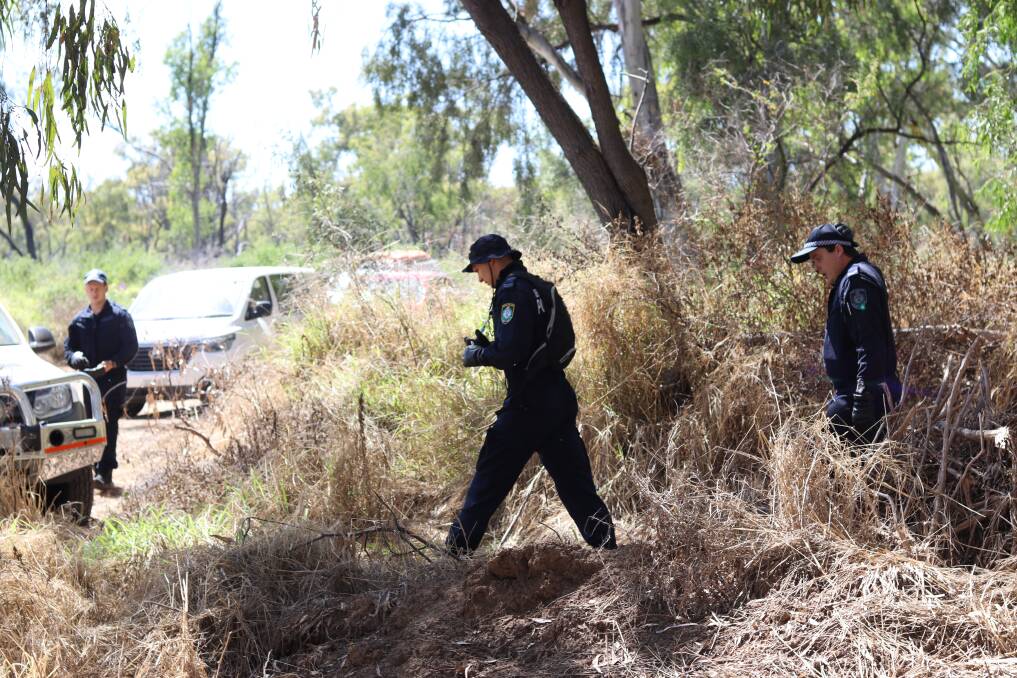
Two police officers involved in the initial search for a man missing from Moree were only a few weeks into their careers, a court has heard.
Subscribe now for unlimited access.
or signup to continue reading
The pair were called as witnesses to speak on day three of a coronial inquest into the death of Gordon Copeland on Wednesday.
Mr Copeland's body was found three months after he disappeared into the Gwydir River during a police incident in the early hours of July 10, 2021. An inquest into his death started at Moree on Monday.
On Wednesday, counsel assisting, Dr Peggy Dwyer, questioned constables Katerina Hinton and Joshua Jones about their training prior to arriving in Moree.
They explained they conducted online training before attending the police academy at Goulburn and were attested at Inverell before starting duties at the Moree Police Station.
"Did any part of your training involve anything about cross-cultural issues?" Dr Dwyer asked. "Did you engage with Aboriginal people?"
She asked once on the job, if they had been provided any information to understand local issues relating to Aboriginal people or if they had any communications with elders.
"There was a full day of training about cultural issues to help give us an understanding of the Aboriginal community of Moree," Constable Hinton said.
This was run by Aboriginal Community Liaison Officers (ACLOs), and there was another event that involved visiting culturally significant sites but not all attended.
"Do you recall learning anything about the history of injustice Aboriginal people in this area have experienced?" Dr Dwyer asked.
"Yes, at that training day provided by the ACLOs," Constable Hinton replied.
"But that is the only day you can recall that you learned about that?" Dr Dwyer asked.
"Correct," the constable said.
MORE FROM THE INQUEST:
Dr Dwyer also asked the officers about their training with police vehicles and their understanding of a pursuit, revisiting the topic of whether the car the victim was in on the night of the incident, was only being "followed" by police.
A lot of the focus though, was on what happened at the scene where Mr Copeland went missing and the events that followed the initial search.
"You were pretty fresh in terms of being a police officer, did you wonder yourself what you were doing or did it seem pretty clear to you?" asked Dr Dwyer.
"Do you think more of your focus at that stage was on apprehending someone rather than worrying about the person's welfare?"
"I was more worried about somebody potentially being in that river than apprehending somebody," Constable Hinton said.
The three officers who have appeared before the inquest so far all stated they believed were at the scene for longer than they were in reality. Time stamps on vehicle radios and body cameras show the search only took place for around 12 minutes.
During that time they witnessed the "dangerous" conditions.
"I thought if someone was to be in that river potentially, with the current as quick as it was, and the debris banging and crashing... they would have found it incredibly difficult to swim, even if they were a strong swimmer, in that circumstance," Constable Hinton said.
READ ALSO:
Footage from two body cameras worn by officers at the scene show the discussion the officers had at the vehicle, believed to be stolen at the time, and after they had ceased the search.
The officer in charge at the scene was told by a probationary constable that someone had gone in the river and may have hurt themselves because they were groaning.
"They either swam across to the other side or were washed downstream in the current," the young officer said.
"Do you agree when you look at the footage now, it looks like the police are not taking it seriously that someone could be in the river?" Dr Dwyer asked.
"When you look at that video, do you agree it shows male officers laughing? That it appears to look jovial or there is a sense of fun or frivolity, a lightness in the discussion?"
Constable Hinton responded that the job of a police officer was to protect life and property.
"If I knew somebody was in that river at that point in time we wouldn't have returned to that car," she said.
"None of those conversations would have ever taken place.
"I believe if somebody needed our help, they would have let us know that they needed our help ... we would have been willing to protect that person's life," she said fighting back tears.
The hearing continues.

